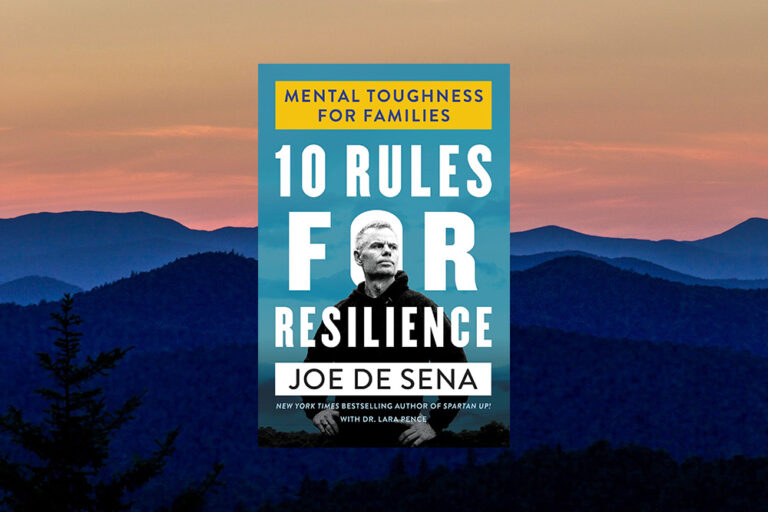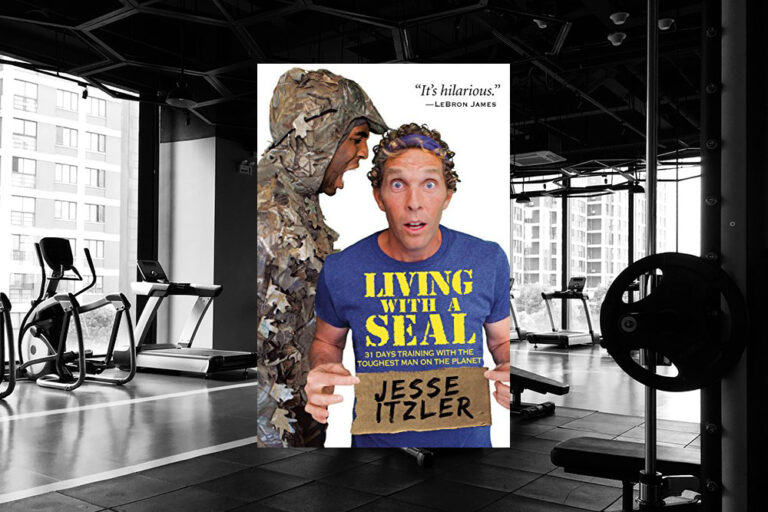#6: Coping Strategies in the Face of Discomfort. Lessons on Resilience From Ross Edgley’s “The Art of Resilience” (Part 2)

To say that Ross Edgley knows a lot about coping in the face of adversity would be an understatement.
During his tortuous 157-day swim across Great Britain, he faced hardships all the time, both physical and mental. They ranged from small nagging issues to disastrous ones.
In the second part of my notes on his book The Art of Resilience: Strategies for an Unbreakable Mind and Body, we’ll cover the strategies he used to stay resilient as he faced adversity.
Note that while his lessons come from his adventurous swim, you can apply them in your everyday life, too. His wisdom isn’t reserved for athletes only.
How to Cope Using the Right Language
Athletes say things like, ‘I cannot go on’ or ‘the pain is unbearable’ and generally complain to themselves and others as a way of coping.
Somewhat unsurprisingly, science shows this is a bad idea. In fact, within this study it was shown that this coping mechanism increased pain sensitivity and reduced pain tolerance, and meant runners spent more time dwelling on its impact on performance. This is why we didn’t allow maladaptive coping strategies, and language associated with it, on the boat.
I wasn’t tired from swimming 930 miles … I was incredibly well practised and ‘warmed up’.
I wasn’t stung by jellyfish … the jellyfish hugged my face.
I wasn’t wearing a waistcoat mankini and gimp mask … I was wearing an advanced form of sea swimming technology.
Looking for every possible upper hand, Ross made sure not to use any negative vocabulary during his challenge. The discipline required to avoid such words was an accomplishment in itself.
Who would say they’re merely “warmed up” after a 930-mile (1497 km) swim in cold water? Many men are “super exhausted” after a longer walk.
Who, stung by a jellyfish, would say that it “hugged” him? Many men would have headed straight to the hospital, to hell with the swim.
It may sound silly to use such word replacements but you have both scientific proof as well as Ross’s example that it does work.
The words we use impact how we think. And the way we think impacts our performance. Choose the right words in the face of adversity.
Next time you want to say “I can’t do it any longer” try a positive alternative:
- This feels way too easy!
- I’m only getting started.
- I still have plenty to give.
- Stay hard!
- They don’t know me, son!
Cope With a Smile on Your Face
As a team, we were using an adaptive coping strategy for everything and anything. It didn’t matter if we were tired, injured or ill, we would always accept the environment and our situation and ease our suffering by choosing a better mindset that helped us manage the various ‘exercise stressors’ so that they don’t trigger ‘signallers’ to tell the brain to ‘stop or slow down.’
Even outside of sport, researchers studying patients with chronic pain conditions found adaptive coping strategies help ‘to restore a sense of self-control over pain (and thus congruence with the situation).’
One strategy that had always worked for me was humour. For over ten years I had tried to smile, laugh and joke my way around marathons and long-distance swims.
After wrestling with strong tides, Ross was sore and in bad spirits. When his brothers surprised him on the boat dressed as Popeye and Poseidon (and acted the part), he cracked up.
His brothers’ humor helped him regain strength and set a new speed record. He titled the chapter in which he shared this story “You’re Stronger When Smiling.”
Smiling through adversity fuels resilience.
I smile when I find myself in uncomfortable situations, too.
For example, when I surf and need to quickly paddle over a larger wave before it breaks on my head, I like to sing in my head.
When I once tried paragliding, my pilot played 50 Cent’s “Candy Shop” from a portable Bluetooth speaker. It was so absurd flying high in the sky while listening to this song that I couldn’t NOT loosen up.
Humor can be the difference between victory and failure. Even the military acknowledges this truth. In the book, Ross points out that a part of the ethos of the Royal Marines is “Cheerfulness in the face of adversity.”
Only the strongest can be cheerful in the face of adversity. So choose a smile over a frown.
The Understated Importance of Managing Stress and Recovery
‘Train as often as you need to, not as often as you can.’ Since, once this limit is reached, further adaptation isn’t possible. When training this means you plateau, but for me and my swim it means it would come to an abrupt halt.
Studies show that an increase in either frequency or intensity, in conjunction with insufficient recovery, may create havoc in the muscle tissue, upset the body’s immunity and harass the delicate balance of the hormonal system. Physiologists call this ‘burnout’ or chronic fatigue, which can be defined as a condition where ‘an athlete who was once energetic, competitive and resourceful becomes chronically exhausted, weak and debilitated. The illness causes curtailment of their competitive sport, professional career and social life for two or more years.’
So the best ‘weapon’ I had against chronic fatigue was an incredibly in-depth and intuitive understanding of my body’s tolerability. This is quite possibly the single biggest reason I was able to continue swimming for 157 days, and for up to 12 hours per day. Not because of strength and stamina. But because I was good at strategically managing ‘stress’ from the comfort of the ship’s galley.
Ross’s accomplishment was even more incredible considering he had no days off because of an injury or sickness.
I can’t imagine swimming on average 12 hours a day for 157 days and my body not breaking even once. Hell, a single 12-hour swim would break most men for weeks.
One of the main reasons of Ross’s indestructibility was his discipline with recovery. He had an excellent pacing strategy combined with a deep understanding of his body.
When he was swimming, he was pushing his limits. But when he wasn’t, he focused on creating the best conditions to recharge before resuming his fight the next day.
To become better men, we need to train pain and embrace discomfort. But we also need to regain our strength before we do it again. This is where recovery (and the discipline to respect it) comes in.
We don’t train hard today like there’s no tomorrow. We train hard today knowing that tomorrow we need to be ready to push again. And again. And again.
Those who win consistently are those who can sustainably practice every day.
Recovery may not be a sexy topic. You may even feel like you’re weak if you allow rest. But if you want to achieve your goals without burning out or destroying your body in the process, a proper recovery protocol is key.
Be proud because you’re disciplined enough to get at least 8 hours of sleep, not because you can get by with four.
Be proud because you’re disciplined enough to listen to your body and fix whatever problems it has before they get severe.
Be proud because you’re disciplined enough to keep a strategic pace instead of gassing yourself out.
I’ve suffered from my share of overuse injuries when I was stupid. And trust me, you aren’t pushing ANY limits when you’re in such pain you can barely stand up.
Seek pain in a manageable way to get stronger every day. This will help you radically expand your abilities without frequent breaks due to injuries.
The Power of a Higher Purpose
‘The tide changes in five hours,’ Matt continued, now standing up from the ladder’s step. ‘I know the North of Scotland sailing authority states dangerous seas, violent waves and strong tidal races should be avoided by small craft, but you’re not a ‘small craft’. You’re a Viking warship making your way home to fulfil a promise made to your dad.’
I nodded. Cape Wrath now had new meaning for me.
Fuelled by a deep-rooted determination to get home, I no longer saw 10 ft waves crashing into the famous lighthouse that’s stood there since 1828 as limitations or restrictions. Instead, I saw a giant signpost (and Viking ‘turning point’) signalling the way home.
From that day on, I understood the Power of a Higher Purpose and began swimming according to the top of Maslow’s Hierarchy of Needs.
One of the major challenges Ross had to face during his swim was hearing the news of his father’s cancer. Edgley, at day 83, was still a long way from completing his project. Giving up would mean the end of his Great British Swim.
Knowing how important the challenge was to his son, Ross’s father asked him to promise to come back only after accomplishing the swim.
The skipper of his safety boat, Matt Knight, helped Ross use the bad news as a powerful high purpose. When Ross faced obstacles during the second half of his challenge, he was unstoppable. He was no longer swimming just for himself. He was swimming to honor the promise he made to his sick father.
Every man needs a higher purpose to thrive in life. Fulfilling your needs works only until it doesn’t.
Would you jump into a raging river to make some money? Unless you were completely desperate and broke, you wouldn’t risk your life for any amount of cash.
Would you jump into a raging river to save your child?
This is the power of a higher purpose.
Once I accomplished my biggest goals in life, I struggled with depression and a lack of meaning. I still do, if I don’t refocus on something other than me.
I’ve seen this happen in other men as well. You climb the mountain to get all the spoils for yourself only to realize it doesn’t fulfill you. The dream needs to be so big that it stretches well beyond one human being.
The only way to be driven through your entire life is to find a reason bigger than you. At the height of a big struggle, when all egotistic reasons fail, your higher purpose is the only thing that will keep you going.
Who do you serve? Who do you protect? What do you stand for?
Questions to Ponder
1. What language do you use when you face struggles? Does it empower you or sabotage you?
2. Do you use humor and smile when you’re struggling or do you let the dark emotions overwhelm you?
3. How do you manage stress? Do you pay enough attention to proper recovery?
4. Do you have a higher purpose in life? When every self-serving motivation fails, would you still have a reason to keep going?
If you want more advice on how to cope in the face of discomfort, sign up for a free weekly Discomfort Club newsletter. Enter your email address below:





